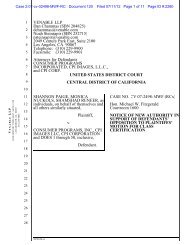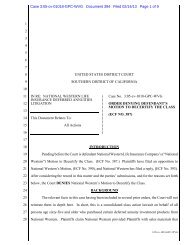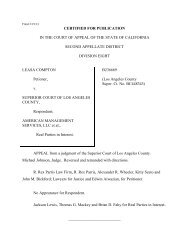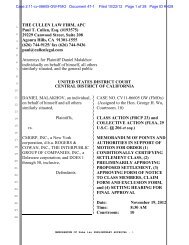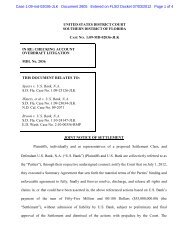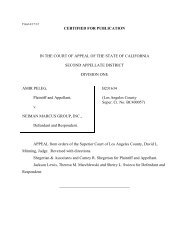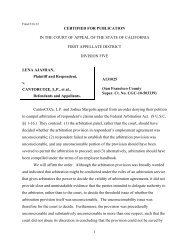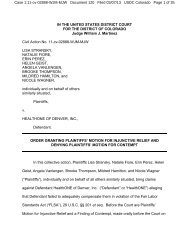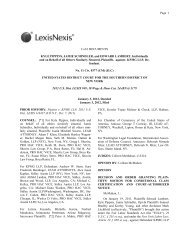order re defendant's motion to stay - Impact Litigation Journal
order re defendant's motion to stay - Impact Litigation Journal
order re defendant's motion to stay - Impact Litigation Journal
You also want an ePaper? Increase the reach of your titles
YUMPU automatically turns print PDFs into web optimized ePapers that Google loves.
Case 1:12-cv-01126-MSK-KMT Document 77 Filed 03/18/13 USDC Colorado Page 2 of 6<br />
collective action and <strong>to</strong> undermine the Notice approved by the court. Further the court found<br />
that Defendants intentionally intended <strong>to</strong> frighten and dissuade former employee putative class<br />
members from joining the class. (Minutes at 2-3.) This court imposed a number of sanctions<br />
against Defendants including that putative class members who <strong>re</strong>ceived the offending letter<br />
would <strong>re</strong>ceive a letter of apology from Mr. Hodges and that a cor<strong>re</strong>ctive notice be sent <strong>to</strong> all<br />
putative class members extending the opt-in period by 45 days after the cor<strong>re</strong>ctive notice is sent.<br />
The court also imposed a monetary penalty against Defendants designed <strong>to</strong> lessen the potential<br />
that any class member would be <strong>re</strong>sponsible for Defendants’ costs if Defendants should p<strong>re</strong>vail<br />
in the litigation.<br />
“Defendants’ Fed. R. Civ. P. 72(b) Objections <strong>to</strong> Magistrate Judge’s Order of February<br />
26, 2013” [Doc. No. 70] was filed on March 12, 2013. Defendants’ p<strong>re</strong>sent <strong>motion</strong> seeks <strong>to</strong> <strong>stay</strong><br />
the court’s <strong>order</strong> imposing sanctions, pursuant <strong>to</strong> D.C.COLO.LCivR 30.2A , until Chief Judge<br />
Marcia S. Krieger rules on these objections.<br />
The power <strong>to</strong> <strong>stay</strong> proceedings, especially as <strong>to</strong> ramifications of its own <strong>order</strong>s, is<br />
incidental <strong>to</strong> the power inhe<strong>re</strong>nt in every court <strong>to</strong> control the disposition of the cases on its<br />
docket with economy of time and effort for itself, for counsel, and for litigants. How this can<br />
best be done calls for the exercise of judgment, which must weigh competing inte<strong>re</strong>sts and<br />
maintain an even balance. Kansas City Southern Ry. Co. v. United States, 282 U.S. 760, 763<br />
(1931).<br />
The Federal Rules of Civil Procedu<strong>re</strong> do not exp<strong>re</strong>ssly provide for a <strong>stay</strong> of proceedings.<br />
See String Cheese Incident, LLC v. Stylus Shows, Inc., No. 02-cv-01934-LTB-PAC, 2006 WL<br />
2



